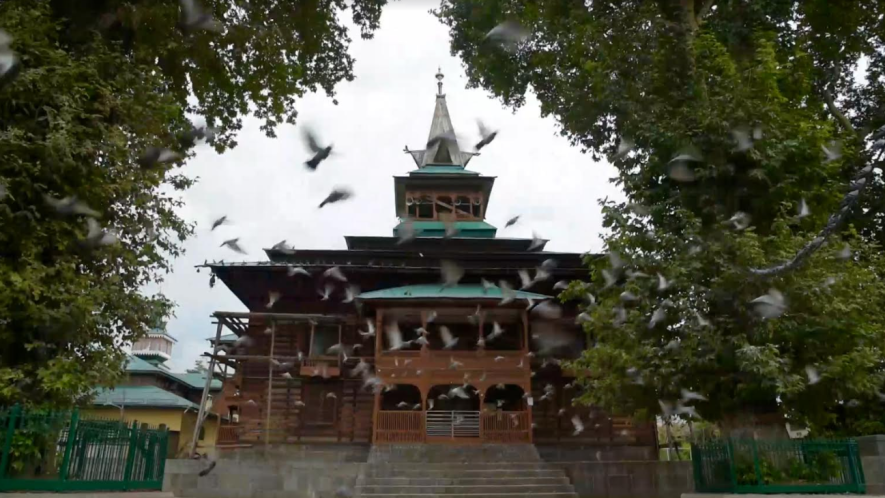J&K Waqf Board Intensifies Drive to Retrieve Land, Property

The Khanqah-e-Moula mosque, Srinagar.
Srinagar: The Jammu and Kashmir Waqf Board has intensified efforts to retrieve land and property claimed by it in the region, including in Srinagar, officials have said.
During her visit to Eidgah, one of the most important Waqf properties in the city, on Sunday, the Board’s chairperson Darakhshan Andrabi said that the Board intends to retrieve more than 200 kanals under “encroachment”.
Andrabi, affiliated with the BJP, told reporters that the Board would act tough against “land grabbers” and the Eidgah land is one of its immediate priorities.
“We are working on it to assert that those who have encroached upon the Waqf land have to vacate it. Some houses and workshops have been constructed but we will retrieve it,” Andrabi said.
The land around Eidgah is spread over around 650 kanals, including a prayer ground on 250 kanals, a playground on 185 kanals and a park on around 90 kanals. The land was bought and later endowed (Waqf) by a 14th century Muslim preacher from Central Asia, Syed Ali Hamdani, who is credited for spreading Islam in Kashmir.
For centuries, tens of thousands have gathered at the spot for mass congregational prayers on Eid. A 15th century mosque called Aali Masjid, one of the biggest managed by the Waqf in the Valley, is also situated adjacent to the ground.
In the last three decades, Eidgah also emerged as one of the political hotspots witnessing mass protests and large funeral gatherings, especially for those killed in militancy-related violence. Many top militants, Hurriyat leadersbelieved to have been assassinated by militants and civilians allegedly killed by security forces are buried in an Eidgah corner called the ‘Martyr’s Graveyard’.
The administration has barred such congregations, including the Eid prayers on the ground, several times. But, Andrabi said, that the Board is trying to hold the Eid Namazthis year and a cleanliness drive would be launched in the coming days.
The Waqf recently also shelved its plan to build a cancer hospital on the land following opposition by many locals and a former chief minister. The process of boundary demarcation of the land will start in the coming days.
The Board is also stepping up to take back control of other properties currently outside its management. According to Board tehsildar Ishtiyaq Mohiuddin, there are more than 32,000 notified properties of the board across the Union Territory. The Waqf manages around 3,000 mosques, 25,000 shops, a dozen schools, four religious seminaries, one nursing college and about 3,000 kanals of agricultural and horticulture land.

“The Board manages less than 4,000 properties, or 10% of the total properties, directly as of now.But we have initiated the process to bring the left out properties under Waqf’s direct control,” he told Newsclick.
Since the process has just begun, Mohiuddin added, the Board is yet to determine the exact encroachment figures.Within Srinagar alone, it is estimated that more than 500 kanals have been encroached upon, including the land around Eidgah. Another key property that the Waqf is planning to map is the city’s central graveyard, known as Malkha, which is also spread over 600 kanals near Srinagar’s Downtown.
The Board’s chairperson also said that it intends to take back the reins of Islamia University of Science and Technology (IUST), Awantipora, Pulwama, and Baba Ghulam Shah Badshah University (BGSBU), Rajouri, Jammu. Both, according to Andrabi, are built on Waqf land.
“The 250 kanals of Waqf land was allotted to IUST and the Waqf Board paid Rs 250 crore to the university for its development. Similarly, BGSBU was built on Waqf land and the Board gave more than Rs 100 crore to the university.But both are not under Waqf’s control,” Andrabi said.
Since taking over as the Waqf Board’s chairperson, Andrabi has announced a slew of changes, including the disempowerment of Sajada Nasheensand Khadims—those who look after the rituals and management of shrines—and disbanding of Intizamiya,or localised management bodies. The move came after Waqf received “reports and complaints” of alleged corruption and embezzlement of funds.
Some have supported these changes calling them necessary “reforms” but many have also termed them as “takeover” by the BJP.
Get the latest reports & analysis with people's perspective on Protests, movements & deep analytical videos, discussions of the current affairs in your Telegram app. Subscribe to NewsClick's Telegram channel & get Real-Time updates on stories, as they get published on our website.
























